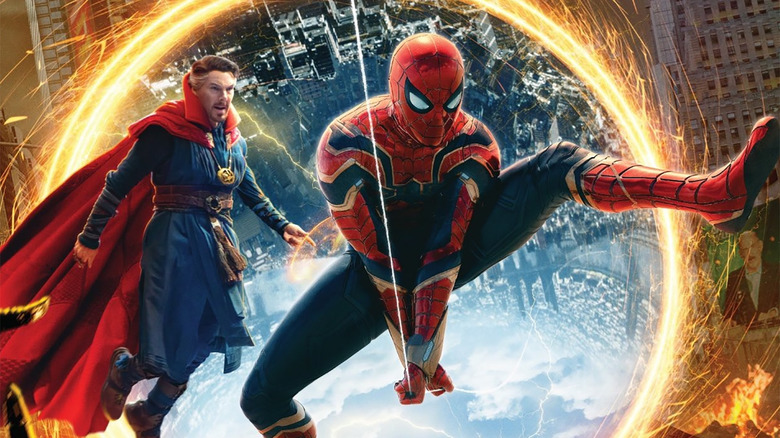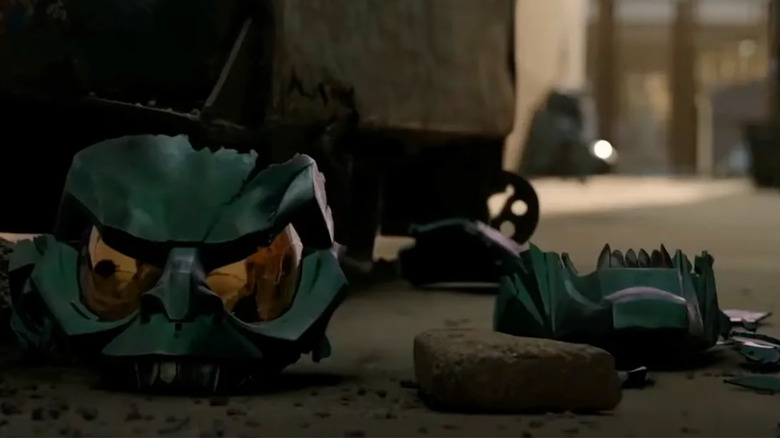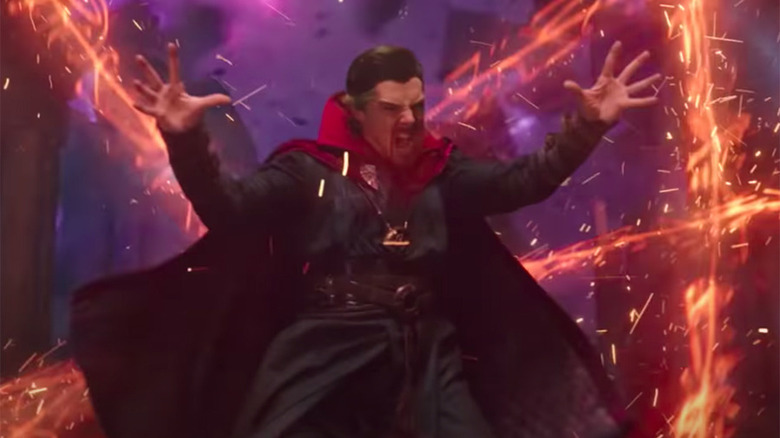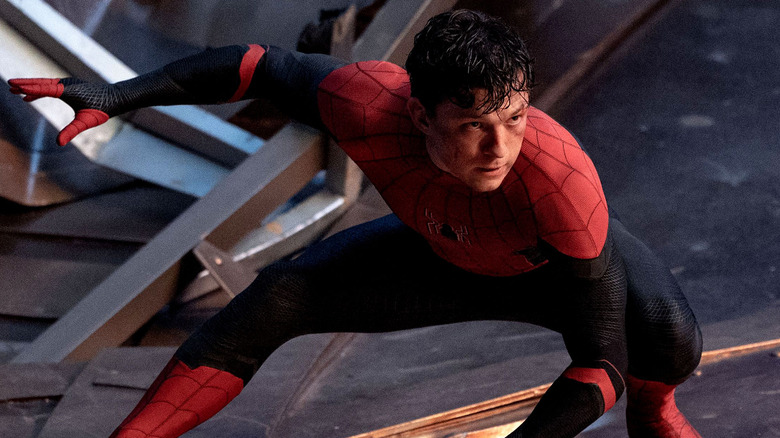How The Multiverse Works In Spider-Man: No Way Home
Now that "Spider-Man: No Way Home" is in theaters, it's time to dig into the nitty gritty of the multiverse. The movie doesn't follow the promise of "Loki," which unleashed the multiverse along with the promise of several worrisome versions of the villain known as Kang the Conqueror (to be played by Jonathan Majors in "Ant-Man and The Wasp: Quantumania" in 2023). Instead, the multiverse, as we experience it in the "Spider-Man" sequel, is a result of Peter Parker tampering too much with a spell that Doctor Strange attempted to cast in order to make almost everyone forget that Peter Parker was Spider-Man, including the (former) Sorcerer Supreme himself.
Stop Tampering with the Spell
As the trailer for "Spider-Man: No Way Home" revealed, when Doctor Strange's creates a spell to make the entire world forget that Peter Parker is Spider-Man, everything goes horribly wrong. Peter Parker realizes that he doesn't want Aunt May (Marisa Tomei), MJ (Zendaya), and Ned (Jacob Batalon) to forget that he's Spider-Man, especially after all that they've been through together, and the spell misfires and nearly breaks open the entire multiverse. As Doctor Strange indicates, the multiverse is a concept about which even sorcerers know very little, so this close call was more than worrisome.
Though it seems like Doctor Strange may have stopped any drastic consequences from unfolding out of the multiverse, Peter Parker learns that not everything is fine. Doc Ock (Alfred Molina) from Sam Raimi's "Spider-Man 2" appears and attacks who he believes to be Tobey Maguire's Peter Parker, only to learn that he's found himself in an entirely different universe. Meanwhile, Doctor Strange himself has captured The Lizard (Rhys Ifans) from "The Amazing Spider-Man" with Andrew Garfield. So what's going on?
Doctor Strange has determined that when the spell went wrong, it allowed characters from other universes to enter the Marvel Cinematic Universe. More specifically, characters who knew that Peter Parker was Spider-Man in their own universe. That's why Electro (Jamie Foxx), Green Goblin (Willem Dafoe), and Sandman (Thomas Haden Church) have also crossed over into the MCU.
Initially, Doctor Strange intends to send everyone back to their own universe by destroying the spell entirely, which he's contained in some kind of mystical cube with a name that isn't easy to decipher in theaters. But Peter Parker makes the decision to help these villains overcome their problems instead of sending them back to die in their own universe. In order to do that, he's going to need some help.
Thankfully, the disastrous spell brought in a couple other characters to the MCU. Since Peter Parker knows himself that he's Spider-Man, Tobey Maguire and Andrew Garfield enter the MCU as their respective versions of the webslinger. They agree to help Tom Holland's Peter Parker round up all the villains and cure them of their corruptive super powers before sending everyone back to their own universe. But there's just one problem.
They're Starting to Come Through
Even though Doctor Strange contained the spell that almost blew open the multiverse in disastrous fashion, Green Goblin ends up destroying the mystical cube keeping the multiverse at bay. When the multiverse threatens to explode into the Marvel Cinematic Universe, Peter Parker chooses to make quite the sacrifice in order to stop the chaos. Peter tells Doctor Strange to cast a new spell that makes everyone forget Peter Parker altogether. Even though this means all knowledge of Peter Parker will be essentially wiped from existence, Peter knows it's the only way to keep the universe from crumbling.
This is an emotional and mature decision for Peter Parker. He's choosing to help those closest to him by not being part of their life. Even though he fully intends to rekindle his relationship with MJ and Ned, he can't bring himself to complicate their lives all over again, and he chooses to tackle the future alone. Furthermore, he's doing it in an all-new Spider-Man suit that he sewed together himself, no longer relying on the technologically advanced suit supplied to him by Tony Stark or even the help of Doctor Strange, who now has no idea who he is. But what does this all mean for the multiverse?
Well, it means everyone from outside the MCU is sent back to their own universes, and the villains who otherwise would have died while fighting Spider-Man get to live another day. However, that might be much more confusing than it seems on the surface. If the likes of Green Goblin, Doc Ock, Electro, Lizard, and Sandman are allowed to live now that they no longer have superpowers to corrupt their mind and wreak havoc, wouldn't that change their universes entirely? It appears that each of the villains was brought into the MCU at the point in their story when they would have died. Wouldn't their return drastically change the future of each of the Spider-Man franchises starring Tobey Maguire and Andrew Garfield?
In the case of Tobey Maguire's Spider-Man, the death of Green Goblin/Norman Osborn creates a complicated future for his friendship with Harry Osborn (James Franco). The entitled Osborn offspring blames Spider-Man for the death of his father, and he ends up turning against his friend and becomes a new version of the Goblin in "Spider-Man 3." Things would probably be a little less complicated for Andrew Garfield's Peter Parker, but I'm not sure that the ramifications of "Spider-Man: No Way Home" were thought through thoroughly when it comes to the impact on other Spider-Man franchises.
Isn't the Multiverse Still Cracked Open Anyway?
In retrospect, perhaps the biggest question after this movie is whether the events of "Spider-Man: No Way Home" actually matter all that much to the larger Marvel Cinematic Universe. It's already been established that the events of "Loki" have opened the multiverse upon the Marvel Cinematic Universe. So did Peter Parker really need to sacrifice his romance and friendship with MJ and Ned in order to save the MCU?
Perhaps the consequences of the multiverse being unleashed on the MCU wouldn't have happened as quickly if Doctor Strange's spell wasn't tampered with, but with "Doctor Strange in the Multiverse of Madness" on the way, it would seem this fix is still only temporary. Could this be a result of Marvel Studios rearranging the chronological timeline by having "Spider-Man: No Way Home" get released first, thereby messing up the manner in which the multiverse was originally intended to unfold?
For now, we know that Kang the Conqueror will be arriving in "Ant-Man and The Wasp: Quantumania," and that's only one of the character's variants who have been threatened to be unleashed in the MCU. Honestly, it seems like the multiverse might be making things even more complicated than we could have imagined, and we hope Marvel Studios has figured out how to keep the timeline from getting more confusing, at least for the sake of general audiences.



